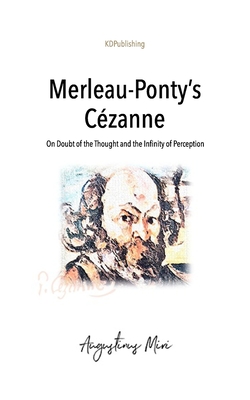Merleau-Ponty's Cézanne: On Doubt of the Thought and the Infinity of Perception

Merleau-Ponty's Cézanne: On Doubt of the Thought and the Infinity of Perception
"Modulation is like thinking without an image of the thought; like experiencing perception conceiving itself. To perceive modulation in its moment of becoming and to experience the moment itself in its becoming. As if we were to comprehend beyond thinking the moment when perception meets the thought beyond thinking, that is, in its pure thought without concepts." Merleau-Ponty's Cézanne seeks to illustrate Merleau-Ponty's phenomenology as a critique of the doubt of thought that enables the infinity of perception. The book explains how Cézanne's color modulations suspend Cézanne's doubt, in contrast to Descartes' Cogito, and illustrates the infinity of perception with examples. In describing the possibility of modulation to deform and reform the world around me, Merleau-Ponty describes the human ability to transcend the boundary between the flesh and the perceived world, which enables the mind to perceive anew through the hand. Quote:
"The percept is the landscape before man, in the absence of man. [...] But why do we say this, since in all these cases the landscape is not independent of the supposed perceptions of the characters and, through them, of the author's perceptions and memories? How could the town exist without or before man, or the mirror without the old woman it reflects, even if she does not look at herself in it? [...] This is Cézanne's enigma, which has often been commented upon: Man is absent from but entirely within the landscape." (Gilles Deleuze & Félix Guattari, What Is Philosophy)
This thought-provoking book dives into Merleau-Ponty's phenomenology, unfolding a critique on doubt of the thought and the infinity of perception. Through insightful and illustrative examples, the book shows how Cézanne's use of color modulation disrupts conventional notions of doubt and presents a response to Descartes' famous Cogito. By suspending the doubt through his work, Cézanne introduces new perspectives on the infinity of perception that inspires to reflect on the possibilities that lie within the act of seeing. Extract:
Modulation is like thinking without an image of the thought; like experiencing perception conceiving itself. To perceive modulation in its moment of becoming and to experience the moment itself in its becoming. As if we were to comprehend beyond thinking the moment when perception meets the thought beyond thinking, that is, in its pure thought witho
This thought-provoking book dives into Merleau-Ponty's p
PRP: 93.00 Lei
Acesta este Prețul Recomandat de Producător. Prețul de vânzare al produsului este afișat mai jos.
83.70Lei
83.70Lei
93.00 LeiIndisponibil
Descrierea produsului
"Modulation is like thinking without an image of the thought; like experiencing perception conceiving itself. To perceive modulation in its moment of becoming and to experience the moment itself in its becoming. As if we were to comprehend beyond thinking the moment when perception meets the thought beyond thinking, that is, in its pure thought without concepts." Merleau-Ponty's Cézanne seeks to illustrate Merleau-Ponty's phenomenology as a critique of the doubt of thought that enables the infinity of perception. The book explains how Cézanne's color modulations suspend Cézanne's doubt, in contrast to Descartes' Cogito, and illustrates the infinity of perception with examples. In describing the possibility of modulation to deform and reform the world around me, Merleau-Ponty describes the human ability to transcend the boundary between the flesh and the perceived world, which enables the mind to perceive anew through the hand. Quote:
"The percept is the landscape before man, in the absence of man. [...] But why do we say this, since in all these cases the landscape is not independent of the supposed perceptions of the characters and, through them, of the author's perceptions and memories? How could the town exist without or before man, or the mirror without the old woman it reflects, even if she does not look at herself in it? [...] This is Cézanne's enigma, which has often been commented upon: Man is absent from but entirely within the landscape." (Gilles Deleuze & Félix Guattari, What Is Philosophy)
This thought-provoking book dives into Merleau-Ponty's phenomenology, unfolding a critique on doubt of the thought and the infinity of perception. Through insightful and illustrative examples, the book shows how Cézanne's use of color modulation disrupts conventional notions of doubt and presents a response to Descartes' famous Cogito. By suspending the doubt through his work, Cézanne introduces new perspectives on the infinity of perception that inspires to reflect on the possibilities that lie within the act of seeing. Extract:
Modulation is like thinking without an image of the thought; like experiencing perception conceiving itself. To perceive modulation in its moment of becoming and to experience the moment itself in its becoming. As if we were to comprehend beyond thinking the moment when perception meets the thought beyond thinking, that is, in its pure thought witho
This thought-provoking book dives into Merleau-Ponty's p
Detaliile produsului










